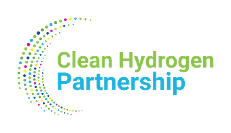EPHYRA refers to the ancient Greek mythology as the daughter of the Titan Epimetheus which dwelled the lands of the Ephyrae, later called Corint and acronym for – Establishing European Production of Hydrogen from RenewAble energy and integration into an industrial environment. The project pioneers a first-of-its-kind 30 MW renewable hydrogen production facility in Southeastern Europe, integrated with Motor Oil of Hellas’ Corinth Refinery. Operating for at least 2 years under commercial conditions, EPHYRA supplies renewable hydrogen to refinery processes and external users, promoting a circular economy and industrial symbiosis. It integrates:
Aligned with Clean Hydrogen Partnership objectives, EPHYRA aims to demonstrate reliable green hydrogen production, contributing to EU renewable hydrogen economy, industry decarbonization, and zero-emission fuels uptake. Implemented by a strong consortium, EPHYRA enhances European synergies in the global hydrogen market, offering a unique proposition for industrial symbiotic renewable hydrogen production.
Stay informed! keep up with
the latest news and events


The project is supported by the Clean Hydrogen Partnership and its members Hydrogen Europe and Hydrogen Europe Research under Grant Agreement No. 101112220